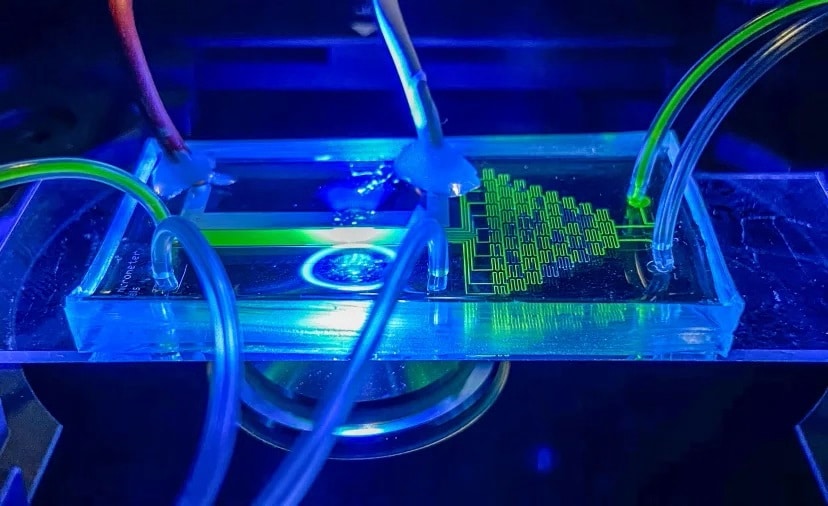PhenoChip provides scientists with important clues about sensitive ecosystems
A team of researchers from Sweden, Denmark, and Switzerland led by SciLifeLab Fellow Lars Behrendt (Uppsala University) has begun to explore how microfluidic technologies can be used to identify, isolate and propagate specific single photosynthetically active cells. The results, published in Science Advances, demonstrates how this new technology can be used to select and propagate cells resistant to the effects of environmental degradation and climate change.
According to the study, PhenoChip is a “platform for the multiparametric photophysiological characterization and selection of unicellular phenotypes under user-controlled physicochemical conditions.” But how does it actually work on a more practical level?
The chip is a microfluidic device for microalgal phenomics, which is the study of observable physical and biochemical changes on algae cells derived from an in vitro selection of traits. Within a microchannel network, it delivers chemical gradients to immobilized cells and can create temperature gradients by applying electrical currents to a conductive path near the microwell array. The researchers also provided the option for exposing the cells inside to gas and light. Once the cells of interest have been identified, they can be ejected from the array via laser dissection, to be used in subsequent experiments or cultivation.
“Similar to our ancestors selecting a more drought-resistant plant, we can now pick and propagate single phenotypes and start asking fundamental questions. What mechanism causes this phenotype to emerge? Does it persist over many generations? Can we use it to obtain increased biomass yields for biotechnological applications or select resilient phenotypes from natural environments?”, says first author Lars Behrendt (SciLifeLab/Uppsala University).
According to the IPCC 1.5 degree report, once we reach a global heating average of 2.0 degrees celsius, nearly all coral reefs will die globally. As about 25 percent of all fish species are found on coral reefs, and over a billion people depend on the ecosystem services they provide these ecosystems are of incredible value. As a first step, the researchers decided to use PhenoChip in the first-proof-of-concept application on single cells essential to coral reef health.
Symbiodinium is algae (also known as zooxanthellae) that live inside corals and performs photosynthesis. The researchers exposed cells from Symbiodinium to thermal and chemical treatments similar to the conditions that induce coral bleaching, events that in the wild accounts for the death of more than 60 percent of the Great Barrier reef located off the east coast of the Queensland mainland, Australia. It’s the world’s largest coral reef and was selected as a World Heritage Site in 1981 and labeled as one of the seven natural wonders of the world by CNN.
Using PhenoChip, the researchers managed to identify single cells with elevated resilience to rising temperatures, and could select phenotypes that were maintained for several divisions of the cell line. This PhenoChip’s assisted evolution of Symbiodinium could help ongoing initiatives that aim to mitigate threats to coral reefs caused by changes in sea surface temperatures and other stress factors.
“Conceivably we could use PhenoChip to create a ‘library’ of desired Symbiodinium phenotypes and try to supply these symbionts, which have not been genetically manipulated but were selected for being more naturally robust, to bleached corals under laboratory conditions. While we don’t yet know whether this would improve the ability of corals to recover and persist in the face of future stress, it’s an exciting thought,” says Behrendt.
Photo: Lars Behrendt





